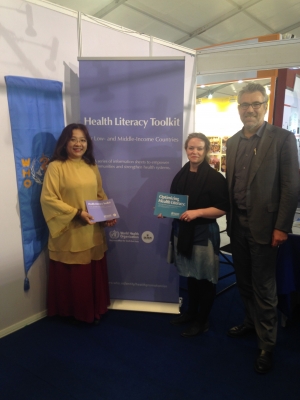Deakin researchers target global health
Research news
From understanding how to access lifesaving treatment, to knowing what hygiene practices should be followed at childbirth, or the consequences of smoking, health literacy is at the heart of human health.
Yet, in many parts of the world, knowledge about good health practices, availability of information and quality of health services is very different to Australia.
Working with the World Health Organisation (WHO), Deakin researchers have developed a set of health literacy tools and resources that they believe will “make a big difference” to improving health outcomes in low and middle income countries (LMICs), such as India, Indonesia and Africa.
The toolkit has had glowing endorsement from one of the world’s most prestigious journals, with the “British Medical Journal” recently editorialising that it was “likely to be a breakthrough” and could help to reduce health inequalities around the world.
The Deakin researchers believe that the key to better health in LMICs is to take a broader perspective than in the past – by improving both individual health literacy and strengthening the involvement of the whole community.
“The Health Literacy Toolkit for Low- and Middle-Income Countries” was developed with WHO’s South East Asia Regional Office from research generated within Deakin’s Population Health Strategic Research Centre – one of the world’s leading research centres on global public health.
The kit encourages key actions and strategies across governments, health services and health consumers – aiming to balance the focus between individual and organisational responsibilities.
Lead toolkit author, Dr Sarity Dodson, from Deakin's Population Health Strategic Research Centre, explained that access to appropriate information and services was fundamental to human health.
“Also, if people don’t have the confidence and skills to communicate their needs, symptoms and concerns - it is unlikely they will receive the right treatment at the right time or participate appropriately in self-care activities,” she said.
Dr Dodson noted that significant progress has been made over recent decades in many countries. For instance, WHO data indicates that maternal deaths in India are now about one third of what they were 25 years ago (148,000 deaths in 1990). Yet about 50,000 Indian women still die during child birth each year. In contrast, in countries like Australia, maternal death is very rare (about 20 maternal deaths/year).
"Previous health literacy efforts have mostly focussed on improving individual reading and understanding of health information. However, whilst the first barrier is literacy, we now understand that several other personal and social characteristics influence engagement – skills, motivation, supports, resources, beliefs and confidence,” Dr Dodson explained.
“The other piece of the puzzle relates to the question of what responsibility health systems have for ensuring information and services are available and accessible to all members of a community, and not just those that live close to healthcare hubs, or who have the financial resources and skills to overcome barriers.”
Toolkit co-author, Professor Richard Osborne, from Deakin’s School of Health and Social Development, added that “lots of health programs in developing countries don’t consider how people make decisions.”
“In Australia, we go to the doctor and ask questions, but decision making is often very different in developing countries. It may be the village leader or a senior person in the family who makes health decisions for a number of people,” he said.
“The toolkit builds on our highly successful local flagship project – Ophelia Victoria, which includes Barwon Health as one of our key partners, who helped us generate and test Ophelia.
“The toolkit provides a really crisp structure for communities to find local wisdom and generate their own solutions. It is being widely distributed around the world and we are really proud that our local Victorian ideas can have such huge potential across so many countries and cultures.”
Share this story
 Authors of the Health Literacy Toolkit: Dr Suvajee Good (WHO), Dr Sarity Dodson and Professor Richard Osborne.
Authors of the Health Literacy Toolkit: Dr Suvajee Good (WHO), Dr Sarity Dodson and Professor Richard Osborne.
